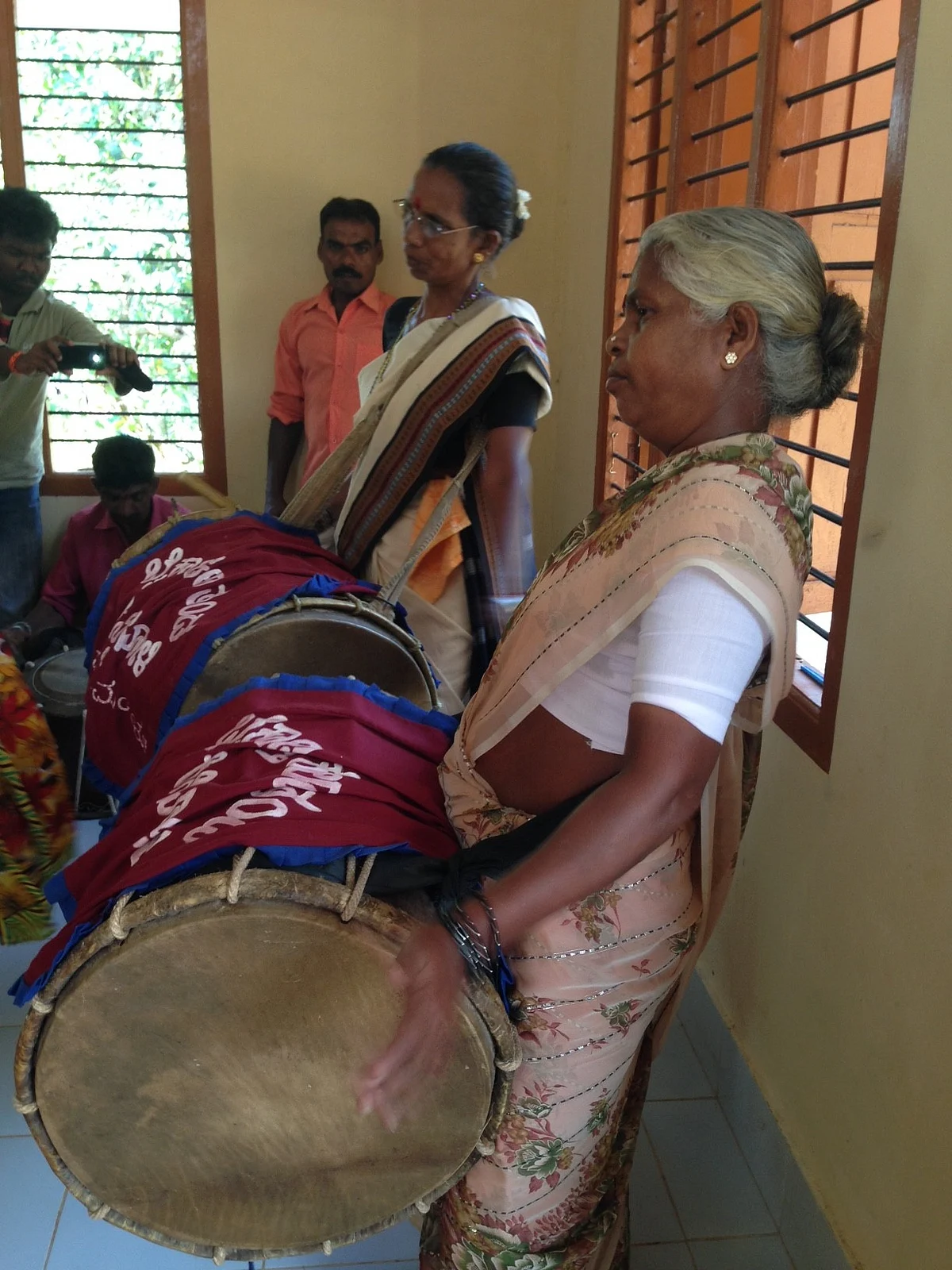Tribal women lead the way; occupy forest land to help community reclaim land rights
Such has been their determination to reclaim their rights, particularly land rights, that even the government of Karnataka has acknowledged the force of these women

Her hair is white, her face wrinkled. But her spirits are high as she belies her age to play the drum hanging around her neck. As she twirls round and round, the beating of the drum becomes more frenzied. The message is loud and clear; playing the drum, once considered a symbol of their caste untouchability, is no longer a stigma. Soon more women participating in the community meeting join the celebrations, dancing and clapping. As the sounds reverberate, it drums a deeper message; women from Koraga and Jenu Kuruba communities, notified as a particularly vulnerable tribal groups in Karnataka, had awoken to their rights and there would be no stopping them now.
Such has been their determination to reclaim their rights, particularly land rights, that even the government of Karnataka has acknowledged the force of these women. By honouring Janakamma, the 65-year old Jenu Kuruba leader, with the prestigious 2019 Kithur Rani Chennamma award, the state government has recognised her unrelenting campaign to uphold tribal rights. It was because of Janakamma’s single-minded focus that 809 tribal families in 16 hamlets in Kodagu district recently received 1800 acres of land under the Forest Rights Act, 2006.
This is a big achievement considering the recent Supreme Court order to evict of over one million tribal people across the country for their inability to prove themselves as forest dwellers as prescribed under the Scheduled Tribe and Other Forest Dwellers (Recognition of Forest Rights), 2006.
In Janakamma’s case, she was able to use Section 3 (1)(m) of the 2006 Forest Rights to press home the community assertions that they have been traditionally residing in forestland for over 75 years and were therefore, rightful claimants to these areas. Together with the Karnataka PTG Community Federation, an alliance between Koragas and the Jenu Kurubas of Kodagu and Mysore districts, Janakamma was able to prove that various legislations like the Karnataka Forest Act, 1963 which divided forests into reserve forest and village forest and the Wildlife Protection Act, 1972, had alienated the tribe not just from their sources of livelihood but also displaced them without proper rehabilitation.
But this huge victory would not have been possible had not Janakamma and other tribal people like the Koragas, realised their rights. It was their association with the Samagra Grameena Ashrama (SGA), the Udupi-based social organisation, and ActionAid India, a not for profit, that helped to empower the Jenu Kurubas and Koragas. Once trained, it was the women who led the way.

Even in the case of the Koragas struggle to uphold their customary right to land and forest entitlements, the strategy suggested by women members of this Aboriginal tribe, was adopted. “We decided that the best way to get the government to listen to us would be to occupy forest land,” said Gowri Kenjur, a Koraga leader. Having been among the 27 community members who went to jail for 15 days after the police cracked down on their public meeting on land rights, Kenjur knew the time for talking was over.
It was decided that the plan would be executed on October 2, the birth anniversary of Mahatma Gandhi in keeping with his principles of protecting rights of the downtrodden. Over 3000 community members, majority of them women gathered in Paladka village in Moodbidri block of Mangalore district. Chosen for the forest land that Koragas had traditionally occupied, Paladka village was to become a landmark in the land rights movement. The women led the procession towards the forest, their beating drums resonating across the village. It was only after land officials agreed to give them a proper hearing, did the women move.
Consequently, some acres of land were handed over to the Koraga community with the women making sure that the land deeds were in their names. “When land ownership is in the name of women, it accelerates gender empowerment.” contended Kenjur.
In fact, both Koraga and Jenu Kuruba women have been at the forefront of the struggle for land rights, pointed out Ashok Shetty, coordinator, SGA. “Even after getting the government to allocate land to families and ensuring women its ownership, there has been no let up in the campaign for land rights. Their self confidence and self reliance has powered the community’s fight to access their rightful entitlements to land.”
(The author is a senior journalist).
Follow us on: Facebook, Twitter, Google News, Instagram
Join our official telegram channel (@nationalherald) and stay updated with the latest headlines
Published: 08 Mar 2019, 6:15 PM